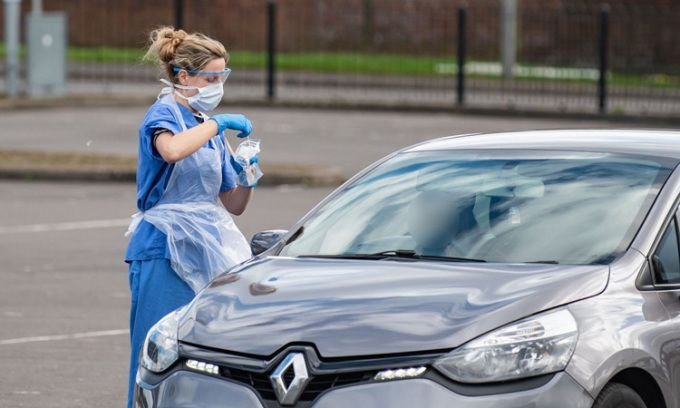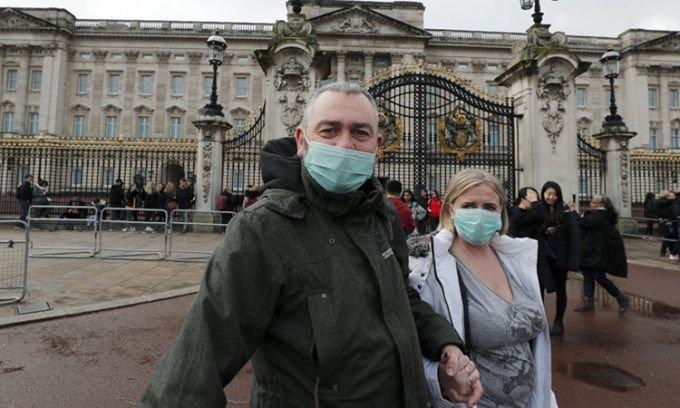
The British health system is at risk of collapse 4
`The National Health Service (NHS) is struggling to cope with Covid-19. Making an appointment with a doctor is now a miracle,` Lakomy-Diep, a 30-year-old accountant, said while standing outside the Hospital.
Covid-19 couldn’t have come at a worse time for the NHS.
`When I had to participate on the front lines of the epidemic, I realized the true impact of lack of resources. We did not have enough nurses and many patients had to wait a long time for surgery,` Rosena Allin-Khan
Allin-Khan believes the UK health system needs to be reviewed.
Medical staff take test samples for drivers in Wolverhampton city.
Prime Minister Boris Johnson said last week that he hoped the peak of Covid-19 could be delayed until late spring to avoid the risk of the NHS being `knocked out`.
`If we can delay the peak of Covid-19, even by just a few weeks, the NHS will be better able to respond to the epidemic, because improved weather will mean fewer people are suffering from common respiratory illnesses.
Ron Daniels, an NHS critical care physician, said if the government’s strategy is effective, the NHS will be able to cope with the epidemic.
`If the epidemic continues to spread rapidly and we cannot change social behavior, the NHS will quickly become overwhelmed, like what happened in the Lombardy region in Italy,` Daniels said.
But across the UK, hospitals are having to suspend almost all operations, except the most urgent procedures, to be ready to handle an incoming wave of nCoV patients.
Many doctors and nurses on the front lines have complained about the lack of testing equipment and protective gear, raising fears that medical staff could be a factor in spreading the virus or being forced to quarantine while the system is recovering.
The most worrying thing is the limited number of ventilators, which will be difficult to meet the demand if the number of patients suddenly increases in the next few weeks, causing doctors to ultimately have to decide which patients to prioritize and treat.
`That’s the story we talk about the most these days,` said Dr. Jenny Vaughan.
The formality and belated preparations left hospitals and medical staff across the UK `strangely calm`, but some doctors described it as a quiet moment before war.
`We feel like we’re just waiting for the enemy to hit us,` said Dr. Nick Scriven, an emergency specialist in northern England.
To avoid a similar scenario to Italy, the British government has introduced a series of regulations to reduce the number of new infections and prevent the NHS system from `rupturing`.
They urge people to stay home and work, avoid going to pubs, restaurants or theaters to limit the spread of Covid-19, the epidemic has so far caused at least 104 deaths and more than 2,600 infections in the country.
During a press conference on March 16, Prime Minister Johnson asked people to avoid unnecessary travel and social contact, and not to go to nursing homes.
`We now appear to be reaching a phase of rapid growth of the epidemic and without drastic action, the number of cases could double every 5-6 days,` Johnson said.
Prime Minister Johnson said he did not order schools to close partly because it would force many parents, including NHS staff, to stay at home to look after their children.

The couple wearing masks stood outside Buckingham Palace, London on March 14.
The NHS is an organization established by the British government in 1948, after the end of World War II, in a reform effort to bring lifelong health protection to the people.
For most of its life, the NHS’s annual budget increases have been around 4% above the rate of inflation.
In the British parliament last week, Ed Davey, leader of the Liberal Democratic Party, criticized Prime Minister Johnson about the lack of health budget.
`We have 8,700 more nurses than last year and are hiring 50,000 more,` Johnson countered.
In a statement last week, British Finance Minister Rishi Sunak pledged to provide all necessary resources to the NHS to fight Covid-19, including a portion from the Covid-19 emergency fund worth 6 billion USD.
It is very difficult for many Britons to accept the fact that the NHS is in trouble because they are so proud of it.
`For them, this system is seen as a social construct because it is comprehensive, universal and free to use. I think it speaks to the British identity, about fairness and solidarity and togetherness
But Tom Gardiner, a respiratory physician at St.
`We’re trying to get by, but we’re almost at the breaking point,` Gardiner said.
But British doctors say they are still trying to hide their fears.



